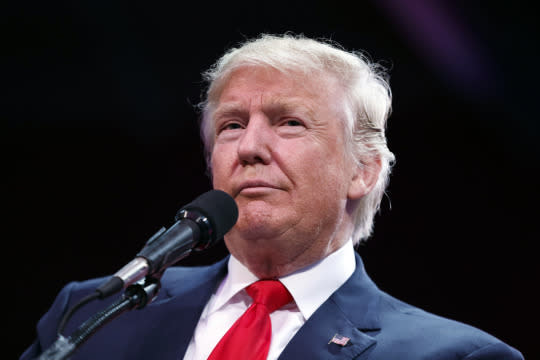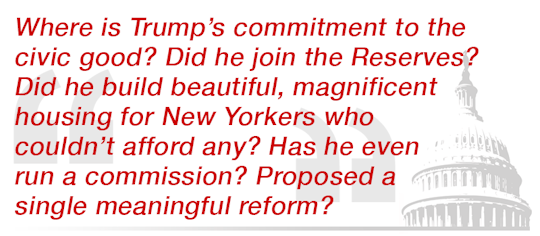Trump’s taxes are telling us something

From the media’s triumphant glee over Donald Trump’s leaked tax returns, which turned up in the New York Times last weekend, you’d think we’d just exposed him as a tool of Russian oligarchs bent on infiltrating American politics.
Oh, wait, we did that, too. Never mind.
It’s not clear that voters really care whether Trump has paid any taxes since Hootie & the Blowfish hit No. 1. It’s often lost on Democrats, in particular, that “economic populism” in the modern age is aimed at least as much at government as it is at big banks; a lot of people seem to think their taxes are mostly being used to screw up their schools and strip-search them at the airport.
If no one was all that bothered when Trump jeered women and people with disabilities and prisoners of war, they’re probably not going to break down and cry over his harsh treatment of the IRS.
But the question I’ve been pondering this week has more to do with those of us who cover campaigns. Why do we care so much about Trump’s tax returns? And should we?
Let’s try to leave aside our biases about Trump, because in fact his supporters are right, and we do tend to show some unconscious bias against candidates who exploit racial animosities, display close to zero knowledge of the world and routinely say things that are patently not true. This is something we need to work on.
No one is alleging, near as I can tell, that Trump violated the law or lied about his income. The only accusation here is that he took full advantage of the tax code to amortize his stupefying losses over a long period, enabling him to avoid paying federal income taxes for a number of years.
And while I’m no one’s idea of a tax policy expert, there are probably good reasons for the “rigged system” everyone keeps railing about. The tax code is designed to encourage risk taking. If your average entrepreneur gets hit with a devastating loss this year, it probably makes sense to let him deduct that loss over a period of years, while he struggles to rebuild.
I’m certainly not passing on any legitimate tax deductions I can take, and Hillary Clinton isn’t, either. Or as Mika Brzezinski put it while discussing the two candidates and their taxes on MSNBC’s “Morning Joe” this week: “Unless laws were broken, you guys cancel each other out.”
Well, yes … and no.

The problem with Trump’s tax history is that it’s emblematic of something larger, a missing plank at the foundation of his campaign. I suspect he knows this too, which is why he so doggedly refused to release his returns, technically defensible as they are.
Simply put, there doesn’t seem to be any record anywhere of Trump having considered the public interest above his own. This isn’t me ripping into the guy for being rich or bombastic; it’s a genuine assessment of his record as a citizen and a celebrity.
If there’s some evidence of Trump having served anyone but himself, ever, for more than one night at some red carpet benefit, I’d like to see it.
This is new in presidential politics. Going back to George Washington, American presidents have more or less fulfilled the ideal of citizen soldiers.
Sure, they come with outsize egos and a craving for power and glory, but they also come to the office with a demonstrated record of service — in state or federal office, or in the military.
You don’t have to like Clinton, and you certainly don’t have to buy that she’s pure of heart. But you do have to acknowledge that she has spent her adulthood in public service, as a government lawyer and a first lady and finally a politician in her own right.
Has Clinton taken opportunities to enrich herself along the way? Sure, and probably too many for propriety’s sake. But anyone who thinks she hasn’t sacrificed something to the cause — that she couldn’t be richer than she is, or couldn’t have led a cushier and less stressful life — is letting ideology cloud all reason.
Where is Trump’s commitment to the civic good? Can anyone produce it?
OK, so he didn’t pay a dime to support federal programs for a bunch of years. Fine. There are plenty of other ways to sacrifice for country and community.
As the young heir to a modest real estate fortune, did he join the Reserves? As a master builder, did he also build beautiful, magnificent housing for New Yorkers who couldn’t afford any? Did he use all that money, like Mike Bloomberg, to build a premier research center for public health?
Has he even run a commission? Proposed a single meaningful reform? Spoken out for any group who couldn’t speak for themselves?

Oh, right. Trump built a skating rink in Central Park, because he got tired of waiting around for it. How you like me now, Bill Gates?
Trump has a charitable foundation. According to some very good reporting by the Washington Post’s David Fahrenthold, he funded that foundation entirely with other people’s money, and then he used some of it to settle lawsuits.
There are always suggestions from Trump’s close advisers (i.e., his kids) that he is the most generous and civically minded billionaire you can imagine — so much so, in fact, that he won’t even tell you how generous and civically minded he’s been, lest his generosity and civic-mindedness be misconstrued as gloating.
I guess if he showed us his tax returns, we’d know.
What does Trump do instead? He runs down every form of public service every chance he gets. Politicians are stupid. Government experts are silly bureaucrats. Generals are dumb. Our best journalists are leeches.
I often wonder what some of the accomplished public servants around Trump, Mike Pence or Rudy Giuliani or Chris Christie, say to themselves when they hear his contempt for the public square spilling out in every direction. Do they think he’s not talking about them?
Hard-truth time, guys. He absolutely is.
Trump’s taxes are merely a reflection of everything else we know about the man — that he is driven by self-interest, to the exclusion of all else. And the fact that his voters probably aren’t bothered by it, that they don’t seem to draw any essential connection between politics and public service, isn’t solely on them, or even on Trump.
It’s on us, too.
For decades now, really going back to Watergate and all the “gates,” real or overhyped, that followed, we in the media have telegraphed a pitiless cynicism when it comes to government service.
Rarely do we take any politician at his or her word, rather than making some wry implication about the underlying agenda. Rarely do we talk about the success of any federal or state initiative, rather than focusing on the unintended consequences. Almost never do we explain why you’re paying taxes, as opposed to how much.

Little wonder that a generation of conservative politicians have managed to campaign successfully for office by crusading against the very offices they hope to hold. And that they now find themselves led by a man who believes he owes nothing to the country beyond making himself available to run it.
The whole tax-return issue matters, in the end, only if we still cling to some shred of belief in this notion of the citizen soldier.
Because Trump is no soldier, and judging from the evidence we have, he’s not much for citizenship, either.

